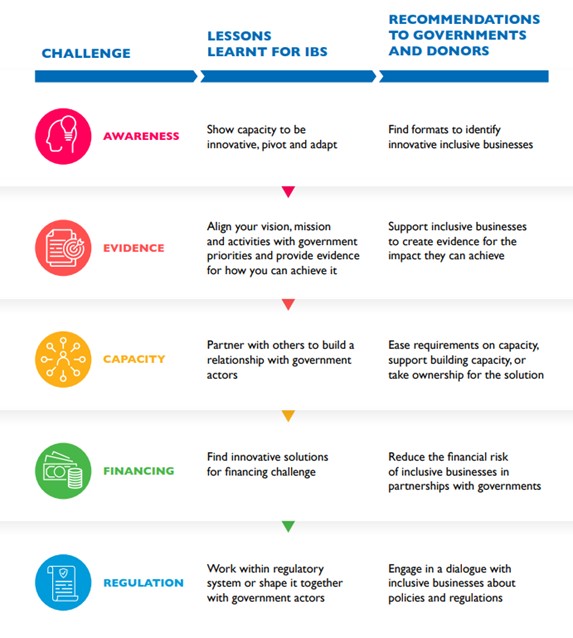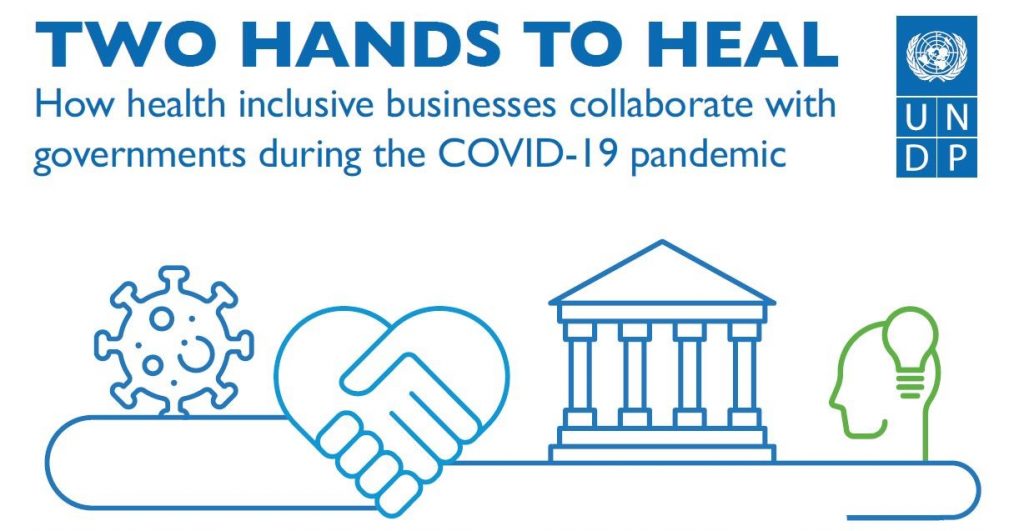UNDP’s Business Call to Action (BCtA) and Endeva are proud to announce the launch of our newest report ‘Two Hands to Heal’, which explores how healthcare inclusive businesses have collaborated with governments to respond to the global COVID-19 crisis and beyond. The report was co-authored by Luciana Trindade de Aguiar, Pedro Cortez (BCtA), Aline Menden and Sandy Henkes (Endeva) and discusses challenges when collaborating with governments, identifies lessons learned from health inclusive businesses and offers recommendations to governments and donors on how to foster and improve collaboration.
A win-win situation for governments and inclusive businesses
COVID-19 caused a systemic disruption in the delivery of essential services. One of the many things that the pandemic has highlighted is the vulnerability of those who lack access to basic healthcare. Already prior to the pandemic, 70% of the global population were living on less than 10 USD per day, and half of the global population lacked access to essential health services. COVID-19 created an additional sense of urgency amongst governments to tackle these challenges. It was almost overnight that governments had to create awareness about Covid or screen entire populations, not to speak of maintaining the provision of treatment and care.
In many cases, inclusive businesses had already found very innovative answers, particularly when it comes to crossing the last mile and tackling the healthcare delivery gap. To do so, they already leverage new technologies and tools such as mobile apps, telemedicine, digital diagnostic devices or artificial intelligence. However, the majority of inclusive businesses face difficulties when it comes to scaling up and replicating their business models, thus falling short on the impact they could achieve.
Governments could play an important role in supporting inclusive businesses to scale. By acting as a service provider to governments or integrating their services into the public health system, inclusive businesses could acquire the scale needed to create impact at scale and make their business models financially sustainable. At the same time, government actors would benefit from innovative and inclusive solutions for crossing the last mile and achieving sustainable health outcomes.
However, collaborating with government actors can be challenging for inclusive businesses. As many are small players, they have difficulties finding the right entry points within large and complex government structures, sitting out long payment periods or gathering enough evidence upfront to be able to succeed in public procurement processes.
This is where the report ‘Two Hands to Heal’ comes in! With the report, we aimed to understand
- Which partnerships already exist, and what can we learn from them?
- What was challenging for these partners – and how did they make it work?
- What are lessons learnt for inclusive businesses and recommendations to governments and donors?
Five key lessons
Based on hands-on experience of BCtA member companies, the report identifies five key challenges, as well as corresponding lessons from existing cases of collaboration. The report also offers recommendations for governments, donors and inclusive businesses (see figure below). Ultimately, we hope that the report will inspire and help facilitate partnerships between inclusive businesses, government and other important players in the healthcare system, making access to quality healthcare a reality for everyone.
Curious? You can find the report here!



